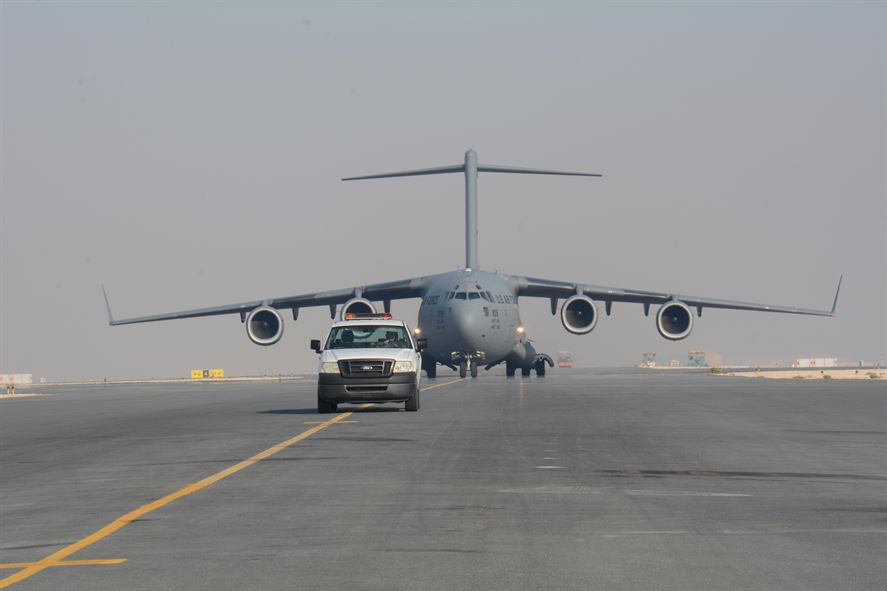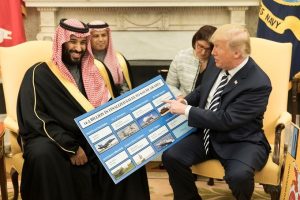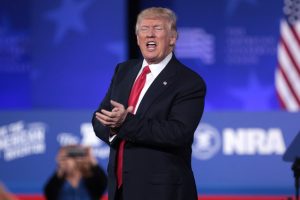by Giorgio Cafiero and Theodore Karasik
The Qatar crisis has quickly become one of the Trump administration’s most sensitive dilemmas in the Middle East. Since America’s close Sunni Arab allies—Bahrain, Egypt, Jordan, Saudi Arabia, and the United Arab Emirates (UAE)—took action against Doha earlier this month, the White House has sent the Qataris mixed messages about Washington’s position on the Gulf Cooperation Council (GCC)’s row. At this juncture, it remains unclear what role the Trump administration will play in Saudi/Emirati efforts to pressure the Qataris into capitulation.
On June 9, Secretary of State Rex Tillerson issued a carefully worded statement urging Doha to clamp down on terrorist financing while also calling on Qatar’s neighbors to ease their blockade on the emirate, which he said was “impairing US and other international business activities in the region” and undermining Washington’s efforts to combat Islamic State (ISIS or IS). Tillerson’s words came shortly after tweets from Donald Trump that suggested that his administration was behind the Saudi/Emirati action against Qatar and less than an hour before the president accused “very high level” officials in Doha of funding terrorist organizations. Evidently, members of the administration have not been on the same page, which has produced anxiety among officials in Europe with whom America must engage on the diplomatic front if Washington’s efforts to broker a resolution to the Qatar rift are to succeed.
Five days later, Qatar’s Ministry of Defense announced that Doha had signed a $12 billion deal to purchase 36 F-15 fighter jets from Washington despite Trump’s recent allegations that the emirate patronizes terrorist groups. According to the Pentagon, this deal will enhance “security cooperation and interoperability” between Washington and Doha. Secretary of Defense James Mattis and his Qatari counterpart Khalid al-Attiyah held talks on the ongoing military campaign against IS and the need for America’s Sunni Arab allies to resolve their rift for the purpose of achieving shared objectives in the region. Attiyah asserted that the deal marks “yet another step in advancing our strategic and cooperative defense relationship with the United States, and we look forward to continuing our joint military efforts with our partners here in the US.” Qatar’s defense cooperation agreement with the US is based on strong military-to-military relations, and the Pentagon signing ceremony highlighted how volatility in Washington’s political arena has not, thus far, impeded the American and Qatari militaries’ close ties. In the words of one Qatari official, this deal is “proof that US institutions are with us but we have never doubted that.”
The same day, two US Navy vessels arrived at Qatar’s Hamad Port, south of the capital, to participate in a joint exercise with the Arab Gulf country’s navy, according to Qatar News Agency. Although it remains unclear if the US decided to send these two vessels to Qatar prior to the eruption of the current diplomatic row, the fact that Washington did not cancel this joint exercise in response to the Qatar crisis is telling.
The mixed messages out of the Trump administration illustrate the divergent views of Qatar held by officials in Washington. From the perspective of Tillerson and Mattis, Doha is an important ally and punishing Qatar threatens to undermine vital US national security interests in the Middle East given that America relies on its USCENTCOM forward headquarters in Al Udeid for ongoing operations in Afghanistan, Iraq, Syria, and Yemen. Fully recognizing that some criticism of Qatar in the area of combatting terrorist financing is legitimate, Mattis testified on June 11 that Doha has been “moving in the right direction” regarding counter-terrorism. Washington’s outgoing ambassador to Doha, Dana Shell Smith, has also come to the Qataris’ defense on this topic since the GCC crisis erupted.
Trump’s tone on Qatar, however, has been harsher. Having taken credit for the Sunni Arab states’ diplomatic and economic action against Qatar, Trump praised the Bahraini, Egyptian, Emirati, and Saudi governments for imposing blockages on the emirate’s air, land, and maritime trade corridors with its neighboring GCC members. Such language was music to the ears of certain DC-based think tanks and lawmakers on the Hill who have spent years advocating that the US seriously consider relocating Al Udeid to another GCC state to pressure Doha into changing a foreign policy that some in Washington argue has undermined key US interests in the Middle East.
The sale of fighter jets to Doha, however, will give pause to those in Egypt and the GCC taking action against Qatar. Signing a major defense deal with the emirate signals that Washington continues to value Qatar as a key US ally in the region despite Trump’s recent speeches and tweets. Another sign that Washington is not cooperating with Saudi Arabia and the UAE’s anti-terrorism agenda came on June 14 when Tillerson testified before the House Committee on Foreign Relations and voiced his deep concerns about designating the entire Muslim Brotherhood a “terrorist” organization.
Despite Trump’s pattern of distinguishing his approach to US foreign policy in the Middle East from his predecessor, the administration appears to be committed to working with Qatar and its fellow GCC states to diplomatically solve their rift much as Barack Obama’s administration did in 2014 during that year’s spat in the GCC. However, more mixed signals and contradictory statements coming from the president and other high-ranking officials in his administration will hinder Tillerson’s attempts to unify America’s Arab Gulf allies behind Trump’s vision of eradicating terrorists and extremists from the volatile Middle East.
Theodore Karasik is the senior advisor at Gulf State Analytics. Photo: A C-17 Globemaster III is escorted to its parking location at Al Udeid Air Base, Qatar (U.S. Air Forces Central Command)






Amazing that someone actually tried to take Trump’s schizophrenia and tried to describe it into a coherent policy. O look, this all makes sense. Well done…I guess
The latest King Tump’s action of dealing with Qatar has nothing to do with the US foreign policy and it all has to do with personal interests and benefits! If everything that is becoming public info reconstructed or reverse engineered usually the opposite of the statement is true! In this case the big distant bully being the US and the local bullies like SA, Bahrain, UAE and Egypt are forcing Qatar to purchase arms from the US! Qatar has been refusing to do that in the past and now King Tump is threatening the other Arabs mostly members of PGCC and putting them on notice unless they pressured Qatar into capitulation! This is all about money for the IMC and benefits in King Tump’s pocket!
By the way please GCC is not an appropriate name and it should be Persian Gulf Cooperation Council or PGCC! Please correct it in the future!